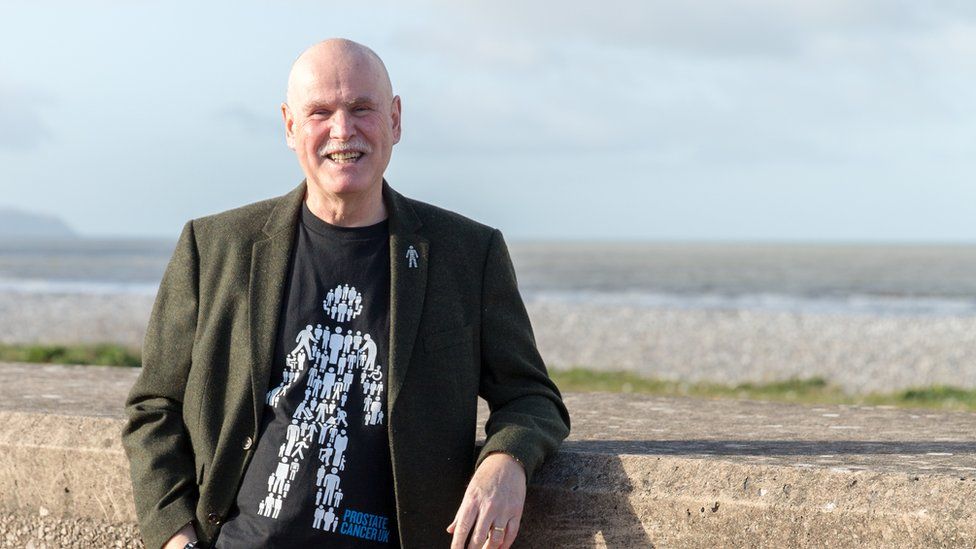
Raymond Starr is taking part in Prostate Cancer UK’s Boys Need Bins campaign
By Catriona Aitken
BBC News
Prostate cancer patients have described the “horrendous” experience of urinary incontinence, which some men undergo as a result of surgery.
Raymond Starr, 68, described being “like a running tap” and feeling “agitated and embarrassed”.
Charity Prostate Cancer UK wants legislation to ensure sanitary bins are available in all male toilets.
The Welsh government said it had already introduced legislation to improve toilet facilities.
Mr Starr, a retired public servant from Abergele, Conwy county, was diagnosed in 2017 after a prostate-specific antigen (PSA) test offered to over-55s identified abnormal levels.
He opted for a radical prostatectomy, after which patients are fitted with a catheter which is later removed, commonly followed by urinary incontinence.
‘I was like a running tap’
“You’re aware of it, but I don’t think you really take on board what’s likely to happen,” said Mr Starr.
“I was literally like a running tap. It was horrendous.”
Prostate Cancer UK said early stages of the disease often had no symptoms, so the side effects of treatments had the biggest effect on people’s quality of life.
The charity said one in eight men got prostate cancer in their lifetime – one in four for black men – and stressed the importance of knowing the risks.
The incontinence was so bad that Mr Starr said he “couldn’t see a way out”.
“I thought, ‘if I’m going to be like this for the rest of my life, I wish I’d never gone ahead with this’.
“I got quite agitated about it, I felt embarrassed. Every time I’d get up from a chair there would be leakage. If I tried to go upstairs to the toilet, by the time I got to the top I was wet through.”
Nigel Rowland from Milford Haven, Pembrokeshire, had a similar experience last year, when he was diagnosed with prostate cancer and opted for surgery in September.
The 65-year-old tow boat captain said: “I was aware that incontinence could well be a side effect, as well as erectile dysfunction, but I thought ‘I want it out and that’s it, I don’t want to be playing around’.”
Mr Rowland said the incontinence was “sort of OK” at home, but problematic when he was ready to get out again.
“Whenever we went out for a walk, or even when I went with my mates for a drink, I had to take a backpack with me.
“Basically you put the soaking wet nappy into the plastic bag. At the start it might even be two. You’d have to walk around and find a bin somewhere, or take it home with you.”
Mr Rowland recalled one occasion when he visited a National Trust site with his family and ended up rushing to the toilet while his daughter’s partner went to retrieve his bag from the car.
“By the time I got to the toilets, it was so wet it was pouring down the inside of my shorts. I felt so embarrassed, uncomfortable,” he said.
“To put it bluntly, I’d drastically wet myself and it’s not a nice feeling.”
Image source, NIgel Rowland
Nigel Rowland says carrying a “soaking wet nappy” around is “embarrassing”
Prostate Cancer UK’s Boys Need Bins campaign hopes to prompt legislation to mandate sanitary disposal bins in all men’s toilets.
Mr Rowland continued: “It’s psychological as well, you don’t want to be walking around with what’s just happened inside your bag.”
Mr Starr added that the “unpleasantness of it all” put him off leaving his home and the NHS-supplied pads were “quite a big, bulky thing”.
“Where do you dispose of that? It’s impossible. It takes a toll on mental health and it limits the freedom of actually moving from home.”
Mr Rowland added: “I made a bit of a joke about it with my friends, because that’s the way I dealt with it, eventually.
“I tried to relate it to cars doing so many miles per gallon, so when I was out with my mates it was how many pints per pad.”
Both men have had successful outcomes from their surgeries and no longer suffer from regular incontinence, but hope that speaking out will raise awareness about the need for bins.
Mr Starr added: “It’s up to the Senedd to be one of the leaders on this. I hope Wales could be the first to roll it out.”
Nick Ridgman of Prostate Cancer UK said there were hundreds of thousands of men with urinary incontinence and it was “deeply unfair” that many men felt anxious about leaving the house.
He added: “It’s frustrating, it creates worry and it doesn’t allow those men or their families to go about their day with dignity.”
Image source, Phs group
Prostate Cancer UK has worked with Phs group to create a suitable sanitary bin for men’s toilets
In May, male incontinence was debated in the Senedd, with Labour’s Carolyn Thomas admitting that she had been “naïve” to the issue before a “chance meeting” with a prostate cancer patient on a train who explained his wife often had to put his used pads in her handbag until they found a bin.
The Welsh government said: “In Wales, local authorities are legally required to produce local toilet strategies and, in doing so, they should take every opportunity to talk to the public and representative groups about the challenges they face in accessing local toilet facilities, listening to their concerns and delivering potential solutions.
“We have issued guidance to local authorities and this highlights that accessible toilets are more important for those with conditions such as incontinence, urgency and prostate problems.”

